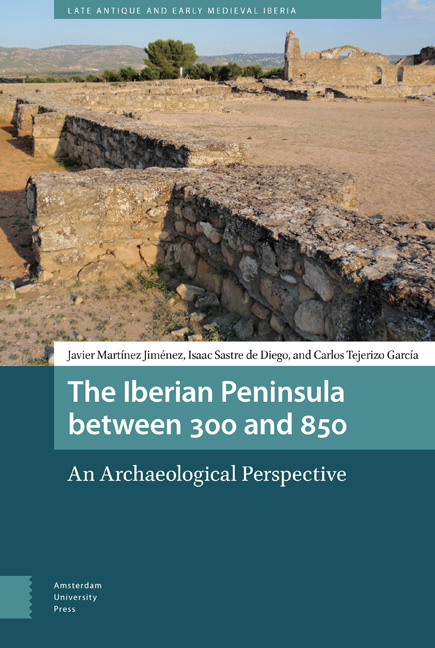Book contents
- Frontmatter
- Contents
- List of Figures
- Acknowledgements
- Preliminary notes
- Preface
- Introduction: An archaeological perspective on the Iberian peninsula between Rome and the Middle Ages
- Part 1 The Late Roman period
- Part 2 The post-Roman period
- Part 3 The Early Middle Ages
- Appendix 1 Site reference table
- Appendix 2 Maps
- Appendix 3 Lists of rulers
- Abbreviations
- Bibliography
- Index
Introduction: An archaeological perspective on the Iberian peninsula between Rome and the Middle Ages
Published online by Cambridge University Press: 10 December 2020
- Frontmatter
- Contents
- List of Figures
- Acknowledgements
- Preliminary notes
- Preface
- Introduction: An archaeological perspective on the Iberian peninsula between Rome and the Middle Ages
- Part 1 The Late Roman period
- Part 2 The post-Roman period
- Part 3 The Early Middle Ages
- Appendix 1 Site reference table
- Appendix 2 Maps
- Appendix 3 Lists of rulers
- Abbreviations
- Bibliography
- Index
Summary
This book aims to put together in a single publication a comprehensive summary of the results of over 25 years of archaeological scholarship on Late Antique and Early Medieval Spain and Portugal, together with an overview of previous research on the topic. In recent years, there has been a remarkable increase in the quantity of available data covering these historical periods as a result of minor interventions, unexpected finds, long-term research projects, and the development of commercial archaeology. This huge amount of fresh data has enabled the development of new avenues of archaeological research for Late Antique and Early Medieval contexts. It has also opened the ground for wholly original, previously ignored or difficult to assess, areas (e.g. peasant societies or agricultural spaces), and also enabled the revisiting of old topics (e.g. the role of the Church or the transformation of Roman urban spaces). The long chronological scope of these processes prompted by the transformations of the late Roman world is the main narrative axis of this book.
This publication is, to the best of our knowledge, the only general comprehensive archaeological approach to the material culture of the Iberian Peninsula for this period, not only in English, but in Spanish as well. Juan Antonio Quirós and Belén Bengoetxea have published recently (2010) a useful handbook of Medieval archaeology, which covers most of the material discussed here, but the scope of their publication is wider in terms of chronology and geography (as it includes Western Europe as well). Rose Walker has, similarly, published in this same series a book on Early Medieval art (Walker 2016), which partially addresses the Roman and Visigothic periods. Besides these, the only general and recent publications that cover this period in Spain have been produced by historians who, despite the various uses they give to the material record, produce their publications from document based perspectives (e.g. Arce Martínez 2011; Collins 2005). As noted above, this material culture based perspective, elaborating a coherent narrative of the Iberian peninsula between the fourth and the ninth centuries, is the main novelty of this book.
Recent finds in Spain and Portugal, and the scientific discussions that have developed from them, have only slowly made their way into wider academic circles.
- Type
- Chapter
- Information
- The Iberian Peninsula between 300 and 850An Archaeological Perspective, pp. 23 - 44Publisher: Amsterdam University PressPrint publication year: 2018



